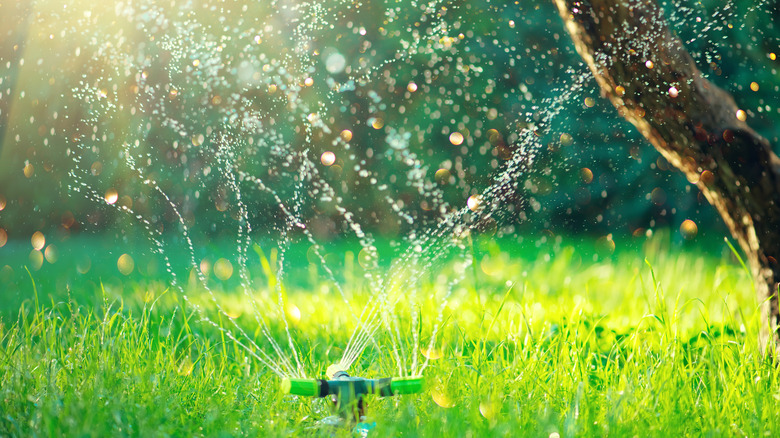Here's Why You Shouldn't Stop Watering Your Lawn As The Temperatures Drop
As temperatures begin to cool and the sun is no longer scorching our gardens, it may seem like a natural step to reduce how much you're watering your lawn. It probably doesn't seem necessary to encourage growth at this time, however, there are several different types of grass that can actually do well in the cooler temperatures common for the autumn months.
Turf Mechanic recognizes that many people want to stop turning the sprinklers on or may not want to stand out in the dark to water their lawns. But, there are very good reasons why you need to turn on the hose — at least for a bit longer. If you care about the survival of your lawn during the winter and you don't want to start off behind in the spring, then a consistent watering regime may be the best way to look after your garden throughout the cooler months.
Fall is part of the growth cycle
Many types of grass thrive during the cooler months. Lawn Doctor states that if you suddenly just stop watering and take away the moisture it needs to grow, the grass could suffer now and well into the spring months. They recommend that you do not stop watering your lawn until your area sees consistent freezing temperatures, even if it seems too cold to water. Moreover, if the weather warms up during the day to warm-to-hot temperatures, your grass needs watering to remain healthy and green.
Once the ground begins to freeze, however, any watering you do will not make it deep enough into the soil to actually reach the roots, so that is ideally when you should stop. With the shorter days and less sunlight present toward the end of the fall months, your grass isn't doing as much growing at this point.
Tips for proper watering
If you are confused about when you should and shouldn't water, The Grounds Guys offer a few additional tips. As noted, you can stop watering when the ground freezes. You also can reduce your watering if your grass is getting about an inch or more of rain each week, as that's often enough to maintain proper moisture in the soil since there's less evaporation occurring. On the other hand, if your area is dry with very little rain, your lawn is going to need the sprinkler turned on at least a few times a week. The same is true in super hot fall months when there are unseasonably warm temperatures.
Don't overwater either, which can give fungus an opportunity to grow in the soil. Fungus may take hold and remain throughout the winter months, too. If the ground is soggy when you step on it, the chances are good that it's too wet. Good lawn care habits in the winter will help to ensure a lush, green lawn in the spring.


